What’s the Difference Between a Crypto Wallet and an Exchange?
When managing cryptocurrencies, many people wonder whether to store their assets in a crypto wallet or leave them on a cryptocurrency exchange. Both options offer unique advantages and play different roles in your crypto journey. However, understanding the difference between a crypto wallet and an exchange can help you make better decisions on where to store and manage your digital assets.
What is a Crypto Wallet?
A crypto wallet is a tool to store your private and public keys, allowing you to access your cryptocurrencies. Wallets give you complete ownership of your assets, meaning only you control them. Wallets can be hardware-based (offline) or software-based (online or mobile). They are ideal for securely storing your crypto and can be used to send and receive funds.
The main features of a cryptocurrency wallet include:
- Private key control: Only the wallet owner can access the private key, essential for managing and controlling your assets.
- Security: A wallet provides more protection than exchanges, as you own and manage your assets directly.
- Self-custody: You have complete control over your funds without relying on third-party platforms.
Walletverse, for example, is a user-friendly mobile wallet that offers security, convenience, and access to over 600 cryptocurrencies.
What is a Crypto Exchange?
A cryptocurrency exchange is a platform where users can trade cryptocurrencies. It acts as a marketplace where buyers and sellers meet to exchange digital assets. Exchanges are typically centralized, meaning the platform holds custody of your funds until you withdraw them. While they are ideal for trading, they do not offer the same level of ownership and security as a wallet.
Main features of a crypto exchange:
- Trading platform: Exchanges allow you to buy, sell, and trade cryptocurrencies. They typically offer a wide variety of trading pairs.
- Custodial service: On an exchange, your crypto is held by the platform, meaning you do not have complete control over your private keys.
- Convenient for traders: Exchanges are great for actively buying and selling but could be better for long-term storage.
Crypto Wallet vs Cryptocurrency Exchange - Comparison
When deciding between a crypto wallet and an exchange, it’s essential to weigh the pros and cons:
Crypto Wallet
- Pros:
- Full ownership of assets with access to your private keys.
- Higher security is needed since funds are not held in an exchange.
- It can be used for long-term storage and is excellent for holding cryptocurrencies securely.
- Cons:
- Less convenient for frequent trading.
- Responsibility for security is entirely on you.
Cryptocurrency Exchange
- Pros:
- Convenient for trading and swapping between various cryptocurrencies.
- Easy to set up and use, especially for beginners.
- Cons:
- You do not control your private keys, meaning the exchange can freeze or lose access to your funds.
- More susceptible to hacking and security breaches.
Ultimately, while exchanges are suitable for trading, crypto wallets provide better security and ownership of your crypto assets. This makes wallets the better option for anyone looking for a more secure, long-term storage solution.
Is It Better to Keep Crypto in a Wallet or Exchange?
The answer depends on how you plan to use your cryptocurrency. Keeping your funds on an exchange can be convenient if you’re actively trading. However, a crypto wallet is the better option for security and long-term storage. With a wallet, you have complete control of your private keys, meaning your assets are in your hands, not an exchange’s. Simultaneously, you can continue to exchange cryptocurrency and buy any assets, including NFTs.
Walletverse, for instance, offers self-custody, ensuring that you have access to your assets only. This eliminates the risk associated with exchange security breaches, making it a safer place to store your crypto long-term.
What Does Self-Custody Mean?
Self-custody in cryptocurrency refers to the user having complete control over their private keys and assets. When you use a self-custody wallet, you are the only person who can access and control your funds.
Self-custody ensures that:
- You are responsible for securing your private keys and assets.
- Only you have access to your funds; even the wallet provider does not have access.
- Self-custody wallets, such as hardware wallets or software wallets, offer enhanced security since your crypto is not at risk of being frozen or hacked on an exchange.
This gives users more autonomy and more responsibility in managing their digital assets securely.
What is the Best Wallet for Crypto?
Here’s a comparison of five popular crypto wallets:
1. Walletverse
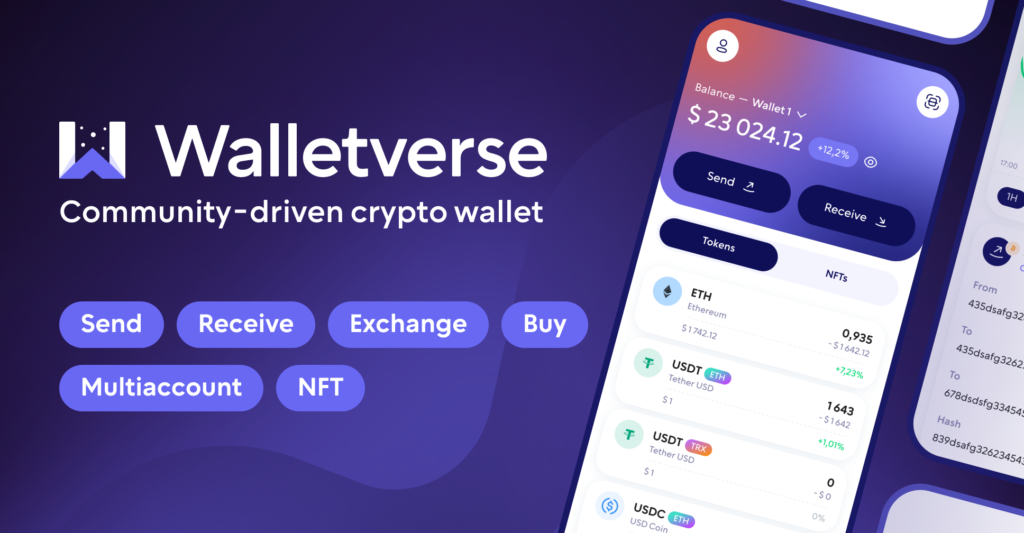
Walletverse is a highly versatile mobile crypto wallet that caters to beginners and advanced users. It supports over 600 cryptocurrencies, making it one of the most comprehensive wallets on the market. With self-custody features, Walletverse ensures you have complete control over your private keys, enhancing security. The wallet integrates with DEX aggregators, helping users find the best trading rates. Walletverse is known for its user-friendly interface and advanced security features, such as biometric authentication and passcode protection.
Pros:
- Supports over 600 cryptocurrencies.
- Self-custody ensures you only have control over your private keys.
- User-friendly and suitable for beginners and advanced users.
- Integrated DEX aggregator for the best trading rates.
- Robust security features like biometric authentication.
- Compliance with AML standards for secure and compliant transactions.
Cons:
- Available only on mobile crypto app
2. Ledger Nano X (Hardware Wallet)
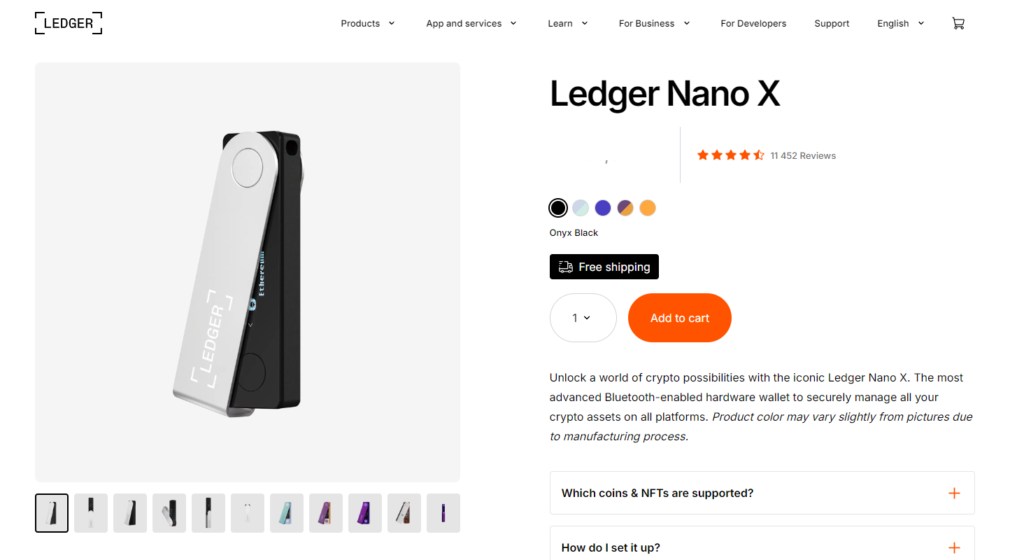
The Ledger Nano X is a top-rated hardware wallet known for its offline storage capabilities, which provide enhanced security against hacking attempts. It supports over 1,800 cryptocurrencies and tokens, making it ideal for users who want to store various digital assets. The Bluetooth connectivity makes it easy to use on mobile devices, offering security and convenience.
Pros:
- Offline storage means your crypto is not vulnerable to online attacks.
- Supports a wide range of cryptocurrencies.
- Bluetooth connectivity for mobile usage.
- High level of security and encryption.
Cons:
- Pricey compared to software wallets.
- It is not more convenient for frequent transactions.
3. Trezor Model T (Hardware Wallet)
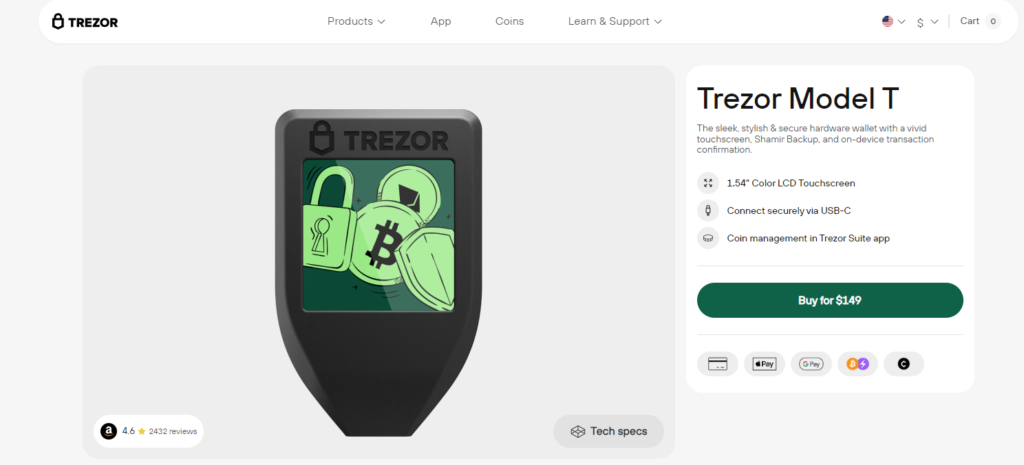
The Trezor Model T is another top choice for users prioritizing security. Like the Ledger, Trezor offers highly secure offline storage against online threats. The touchscreen interface makes it easy to use and supports multiple cryptocurrencies. Trezor is also compatible with third-party apps like MetaMask, making it a good choice for those who want added flexibility with DeFi platforms.
Pros:
- Offline storage ensures high security.
- Touchscreen interface for more straightforward navigation.
- Compatible with third-party apps like MetaMask.
- Supports a wide range of cryptocurrencies.
Cons:
- It is more expensive compared to other hardware wallets.
- Less convenient for day-to-day transactions.
4. Trust Wallet (Mobile Wallet)
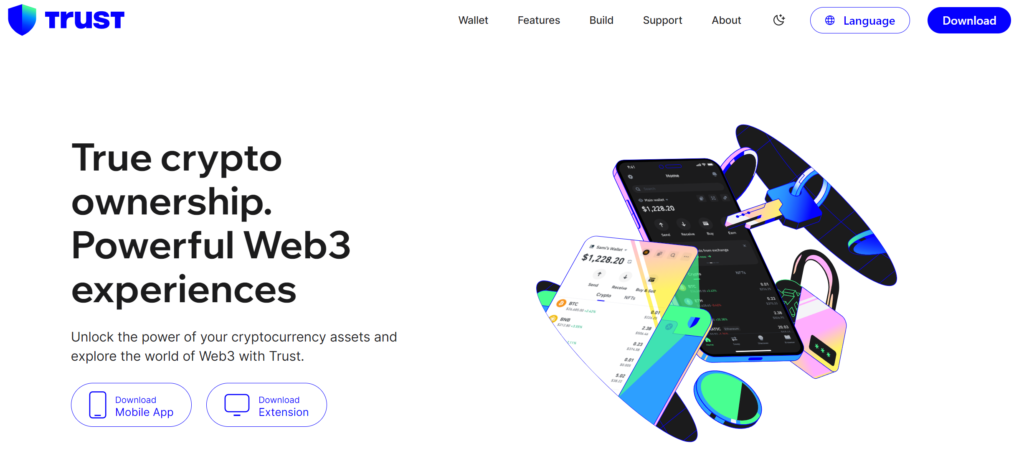
Trust Wallet is a free, open-source mobile wallet that supports many cryptocurrencies, including Bitcoin, Ethereum, and others. It’s easy to use and integrates with the Binance DEX, allowing users to trade directly within the wallet. Trust Wallet also provides users with full control over their private keys. It’s a great option for a simple and secure mobile wallet.
Pros:
- Free to use and easy to set up.
- Supports a wide variety of cryptocurrencies.
- Full control over private keys.
- Integration with Binance DEX for trading.
Cons:
- Limited customer support.
- No desktop or hardware integration.
5. MetaMask (Browser Extension Wallet)
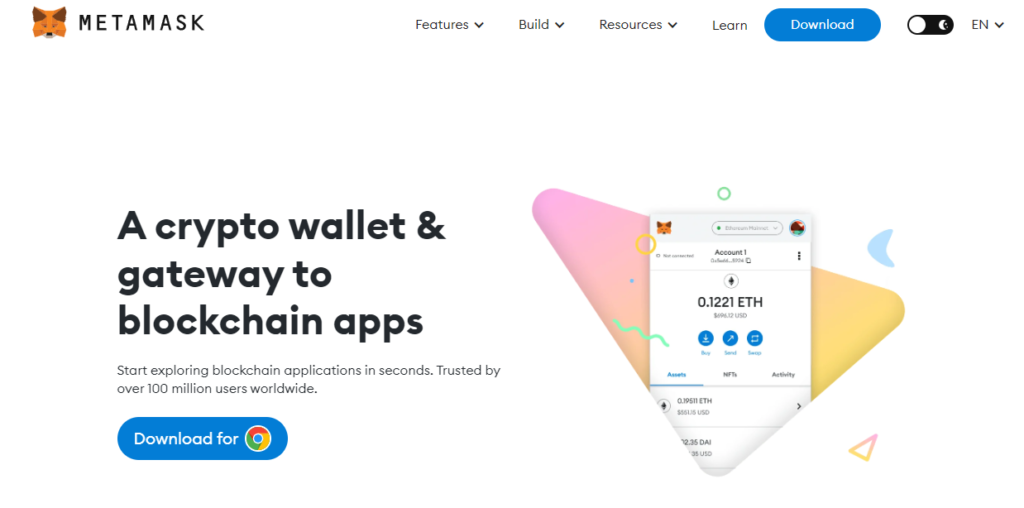
MetaMask is a popular browser-based wallet for users engaging with Ethereum-based dApps and decentralized finance (DeFi) platforms. It’s simple to set up and is available as a browser extension for Chrome, Firefox, and Brave. MetaMask allows users to store ERC-20 tokens and interact with decentralized applications directly. However, since it’s browser-based, it’s more vulnerable to phishing and hacking attempts than hardware wallets.
Pros:
- Great for interacting with dApps and DeFi platforms.
- Easy to set up as a browser extension.
- Supports all Ethereum-based tokens (ERC-20).
Cons:
- Limited to Ethereum-based assets.
- Being browser-based makes it more vulnerable to phishing attacks.
FAQ
Most frequent questions and answers
No, a crypto wallet stores your private keys and manages your cryptocurrencies securely, while an exchange is a platform for trading and buying cryptocurrencies.
Keeping your crypto on an exchange means you do not control your private keys, making your funds vulnerable to exchange hacks, freezes, or mismanagement. Storing crypto in a wallet gives you full ownership and control.
Yes, especially if you plan to hold onto your crypto long-term. Moving your crypto to a wallet like Walletverse ensures better security and ownership of your assets.
To transfer crypto from an exchange to a wallet, follow these steps:
- Copy your wallet’s address from Walletverse.
- Log in to the exchange and select the crypto you want to withdraw.
- Paste the wallet address and confirm the transaction. Within minutes, your crypto will arrive safely in your wallet.
- And you can continue to buy it, store it or use it for staking.